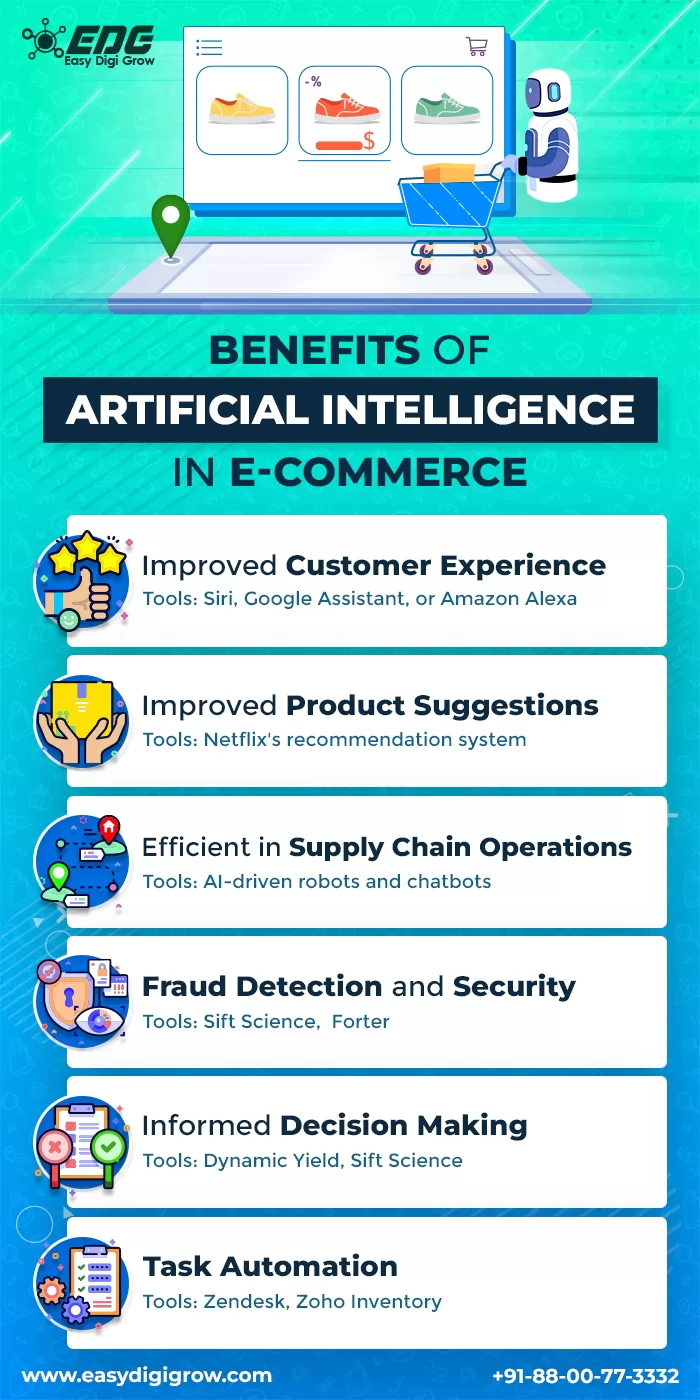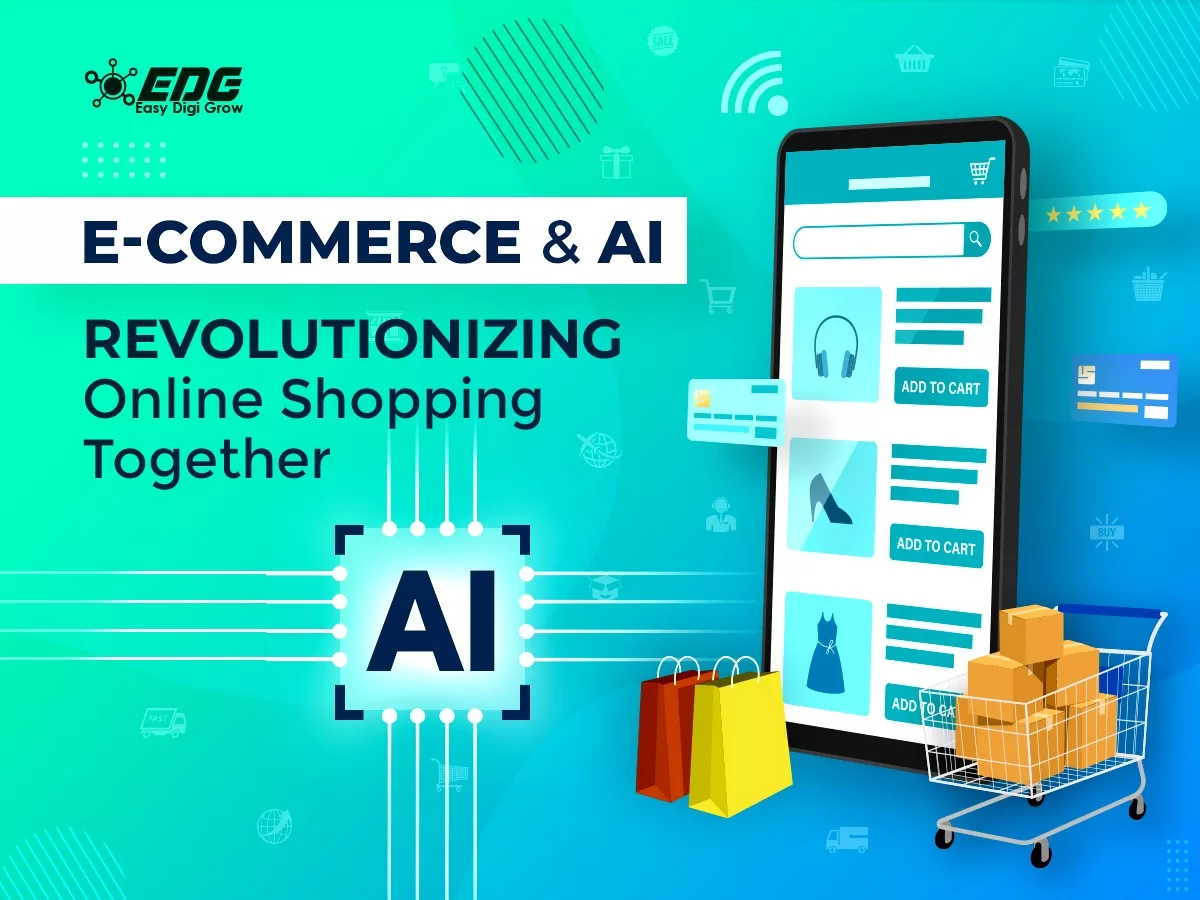Explore how, with the help of AI in e-commerce, you can create a very smart and impactful online shopping experience for your customers. In this comprehensive blog, you will explore, from zero to everything, how AI and e-commerce are winning together and developing the online shopping landscape.
AI in the E-Commerce Industry
If you’re somewhere in between knowing a lot about artificial intelligence and E-Commerce’ and not having more clues about it, this is the right place to be. After going through this article, you are going to have well-informed details about AI-powered e-commerce and how it is reshaping the world of online shopping.
“In the age of AI, e-commerce will be transformed. Smart algorithms will revolutionize the way we shop, making it more personalized and efficient.” – Jack Ma, Co-founder of Alibaba Group.
This is the age of AI (artificial intelligence), and it’s fascinating to learn how AI is transforming the world of e-commerce. In this comprehensive blog, you will explore from zero to everything how AI and e-commerce are winning together and developing the online shopping landscape.
AI has paced up the online marketing space by making the shopping experience more efficient and enjoyable. Together, it’s creating an excellent experience for customers while meeting all their needs and expectations.
AI Revolutionizing the E-Commerce industry?
A few years ago, there was no clue that AI would have such an impact on online businesses. For any business online today, it’s very important to stand out and mark your presence. This can only be possible when you have in-depth knowledge about what you are doing, what you are going to do, and what your consumers expect from you.
“As AI continues to evolve, it will redefine the retail landscape, empowering businesses to anticipate customer needs and deliver unparalleled shopping experiences.” – Ginni Rometty, former CEO of IBM
AI tools for e-commerce have not only made this entire process easy and accessible but have also helped businesses create a lasting impression on their customers while building strong relationships.
Benefits of AI i
Improved Customer Experience
AI in E-Commerce helps in creating better customer experience by providing personalized recommendations, they assist with customer support with chatbots for instant feedback and concerns. This allows you to create a well-tailored shopping experience for your consumers.
For instance: Siri, Google Assistant, or Amazon Alexa
Improved Product Suggestions
Ecommerce
AI algorithms support the analysis of user behavior and keep track of their preferences by product suggestions, dynamic pricings & other supply chain management strategies. Moreover, they provide better Cross-selling and Upselling Opportunities for your business.
For instance: Netflix’s recommendation system
Efficient in Supply Chain Operations
AI can easily analyze large data at a time it also helps in analyzing and identifying several trends & patterns. It provides better inventory optimizations & streamlines the order processing.
For instance: AI-driven robots and chatbots
Fraud Detection and Security
AI in e-commerce takes good care of fraud and security-related concerns, be it fraud prevention, enhanced payment security, or real-time monitoring for and concerning behavior.
For instance: Sift Science, Forter
Informed Decision Making
E-commerce AI tools make it easy to analyze things for business insights and analyze customer behaviors. All these things together promote better analysis and decision-making related to marketing and trends.
For instance: Dynamic Yield, Sift Science
Task Automation
AI-driven strategies promote efficiency within tasks. This helps in better task operations and gives a competitive edge. When you automate customer service, it allows a flow within the system, and the customers feel taken care of.
For Instance: Zendesk, Zoho Inventory
Apart from all these benefits, there are several more areas where AI provides a winning edge in e-commerce. For instance, Increased efficiency in operations, which removes manual errors and makes the operations easy, Personalized marketing campaigns allow targeted advertising and customer segmentation, certain pricing adjustments, and scalability and growth.

Contact Us for Expert Guidance on Your E-Commerce Journey
Applications of AI in E-commerce
AI is capable of handling several things at a time, and here we are going to discover the applications of AI in e-commerce examples.
- Streamlined Product Pricing
AI allows to personalize the product pricing with respect to demands and supply. This makes it easy for you to allow discounts and do several other product related predictions.
Eg. Prisync, Wiser
- Customer Engagement
Customers are the key to a successful business and customer satisfaction is the key towards a winning strategy. When you provide a seamless experience to your customers and make them feel like they belong , it helps them engage better and trust your service. This helps in creating lasting relationships.
Eg: Chatbots and Virtual Assistants
- Detection of fraudulent transactions
Use of AI in e-commerce helps in analyzing transaction data for irregularities and patterns and quickly detecting such activities by monitoring and performing security measures.
Eg: Signifyd
- Improved Social Media Monitoring
E-commerce AI tools help in monitoring social media by accessing large amounts of data at a time and easily identifying trends, emotions, and customer preferences, which allows businesses to make informed decisions and do better marketing.
Eg: SocialSiftAI, CommerceInsightAI
- Analyzing Customer Sentiments
AI tools in e-commerce help in analyzing customer behavior using natural language processing, analyzing behavior, and providing insights for a better understanding of business.
Eg: Google Cloud Natural Language API, IBM Watson Natural Language Understanding
- Virtual Product Imaging
AI provides automation for product images. You can easily do image editing and generate realistic 3D visuals by providing personalized products and improving the overall online shopping experience for customers.
Eg: Augment
Moreover, AI has no limited applications; it can be applied to several other places as well, like product search optimizations using visual recognition, efficiently controlling inventory, creating product descriptions, and better business-related automations.
Challenges of using AI in ecommerce
Everything comes with pros and cons, and there’s no denying the fact that AI can also have some concerning challenges. Let’s discuss them in detail:
Data Security & Privacy related concerns
We know how AI is capable of processing large amounts of data at a time, Which can eventually lead to concerns related to unauthorized access, data misuse, breaches, and other threats to sensitive data.
Integration and Implementation Challenges
While utilizing AI for e-commerce, there can be various challenges, like data integration, compatibility with systems, user adoption, and alignment of multiple platforms, which raise concerns regarding data quality and other privacy concerns.
Ethical Concerns
There can be ethical concerns related to the biased behavior of AI-related algorithms, privacy, and job displacement. There can be threats of job losses and other ethical considerations needed.
Have Questions? Reach Out—We’re Here to Assist You!
FAQ
How is ai used in e-commerce
AI has eased things for e-commerce businesses. With efficiency in personalization, customer support using chatbots, predictive analysis, and several machine-related operations, it is delivering precise and targeted results. Moreover, this improves search algorithms, enhances marketing strategies, and boosts sales and customer satisfaction.
How to use ai in ecommerce
AI in e-commerce can be used in many ways, such as personalizing the user’s shopping experience, efficiency, sentiment analysis, voice assistants, customer journey mapping, routine task suggestions, prevention and fraud detection, and A/B testing optimization.
Name the components of artificial intelligence?
Following are the components of artificial intelligence that work together to perform tasks and help adapt to new situations.
Machine Learning (ML, Neural Networks, Natural Language Processing (NLP, Computer Vision, Computer Vision:, Robotics, Planning and Decision Making, Knowledge Representation and Reasoning, Data Mining & Speech Recognition.
What are the benefits of AI in E-commerce?
There can be many ways in which use of AI in e-commerce brings efficiency and benefits, like: Voice commerce, virtual assistants, better customer retention, smart search, personalization, automations, smart logistics, customer segmentations, and many others.
How is machine learning applied in ecommerce?
Implementations of machine learning in e-commerce can help with personalization, efficiency, and a better shopping experience for users. It can be applied for Product Recommendations, Cross-Selling and Up-Selling, searching, discovering, dynamic pricing, fraud detection, customer segmentation, personalization, inventory management, virtual assistants, chat bots, customer service automation, Ad targeting,
 seolounge
seolounge


